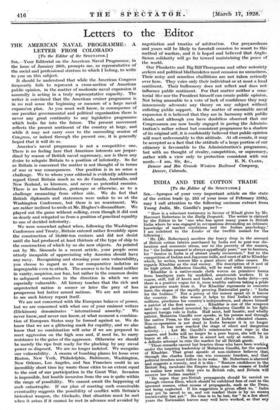Letters to the Editor
THE AMERICAN NAVAL PROGRAMME: A LETTER FROM COLORADO
[To the Editor of the SPECTATOR.] Sia,—Your Editorial on the American Naval Programme, in the issue of January 28th, prompts me, as representative of the social and prbfessional stratum to which I belong, to write to you on this subject.
It should be understood that while the American Congress frequently fails to represent a cross-section of American public opinion, in the matter of moderate naval expansion it assuredly is acting in a truly representative capacity. The writer is convinced that the American cruiser programme is in no real sense the beginning or measure of a large naval expanepn plan. As you must well know, in consequence of our peculiar governmental and political organization there is never any great continuity to any legislative programme which looks far into the future. The present movement reflects the present sentiment of the country at large, and while it may not carry over to the succeeding session of Congress, or indeed through the present one, it is generally hoped that it will do so. - America's naval programme is not a competitive one.
There is no feeling here that American interests are jeopar- dized by reason of British naval supremacy, nor is there any desire to relegate Britain to a position of inferiority. So far- as Britain is concerned the matter is not thought of in terms of war or war consequences. Our position is in no sense a challenge. We to whom your editorial is evidently addressed regard Great Britain much as we do Canada, Australia, and New Zealand, as kinsmen, and never as potential enemies. There is no hallucination, grotesque or otherwise, as to a challenge emanating from either side. We do feel that British diplomats and statesmen were unfair to us at the Washington Conference, but there is no resentment. We are rather inclined to smile at Mr. Hughes's discomfiture. We played out the game without sulking, even though it did cost us dearly and relegated us from a position of practical equality to one of decided inferiority.
We were somewhat aghast when, following the Washington Conference and Treaty, Britain entered rather feverishly upon the construction of 10,000-ton cruisers and did not desist until she had produced at least thirteen of the type of ship to the construction of which by us she now objects. As pointed out by Mr. Simonds in a recent article, your people seem utterly incapable of appreciating why America should have any navy. Recognizing and stressing your own vulnerability, you choose to regard us in our comparative isolation as impregnable even to attack. The answer is to be found neither in vanity, suspicion, nor fear, but rather in the common desire to safeguard ourselves in the direction in which we are especially vulnerable. All history teaches that the rich and unprotected nation is sooner or later the prey of less prosperous but better armed nations. We are not anxious to see such history repeat itself.
We are not concerned with the European balance of power, but we are concerned with what one of your eminent writers (Dickinson) denominates "international anarchy." We never know, and never can know, at what moment a combina- tion of European States may be formed against us. We do know that we are a glittering mark for cupidity, and we also know that no combination will arise if we are prepared to meet aggression on the high seas and, if need be, to carry resistance to the gates of the aggressor. Otherwise we should be merely the ripe fruit ready for the plucking by any naval power so disposed. We are no longer isolated. We recognize our vulnerability. A swarm of bombing planes let loose over Boston, New York, Philadelphia, Baltimore, Washington, New Orleans, Los Angeles, and San Francisco could in an incredibly short time lay waste those cities to an extent equal to the cost of our participation in the Great War. Invasion is impossible, but hostile incursion from the sea is quite within the range of possibility. We cannot await the happening of such catastrophe. If our plan of -meeting such conceivable eventuality suggests the possibility of conflict with Britain's historical weapon, - the blockades that situation must be met Nrhen it arises if it cannot be met in advance and avoided by
negotiation and treaties of arbitration. Our preparedness._ and yours will be likely to forestall occasion to resort to this method of warfare, and it is hoped and believed that Anglo- Saxon solidarity will go far toward -maintaining the peace of• the world.
Our Plunketts and Big Bill Thompsons and other notoriety seekers and political blatherskites need occasion no uneasiness.: Their noisy and senseless ebullitions are not taken seriously over here. They voice only their individual or at most a local sentiment. Their buffoonery does not reflect and does not influence public sentiment. For that matter neither a sena- torial h&c nor the President himself can create public opinion. Not being amenable to a vote of lack of confidence they may innocuously .advocate any theory on any subject without enlisting public support. In the matter of reasonable naval expansion it is believed that they are in harmony with public ideals, and although you have doubtless observed that our Congressmen are now busily engaged in paring the Adminis-. tration's rather robust but consistent programme to a shadow of its original self, it is confidently believed that public opinion will react unfavourably to this attitude. At all events, it may be accepted as a fact that the attitude of a large portion of our citizenry is favourable to the Administration's programme, but with no thought of rivalry, competition, or supremacy, rather with a view only to protection consistent with our needs.—I am, Sir, &c., E. N. CLARK. Denver and Rio Grande Western Railroad Company, Denver, Colorado.










































 Previous page
Previous page